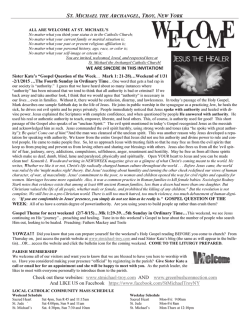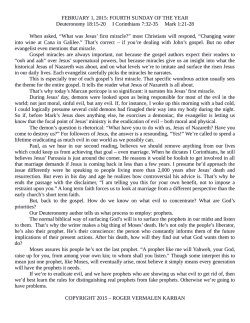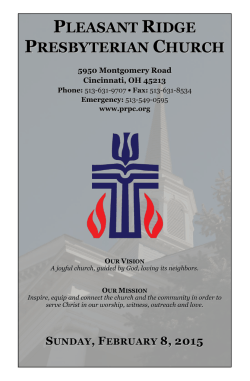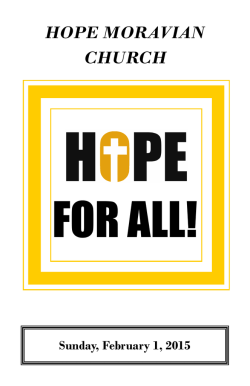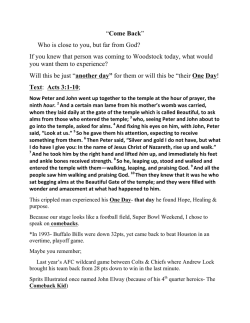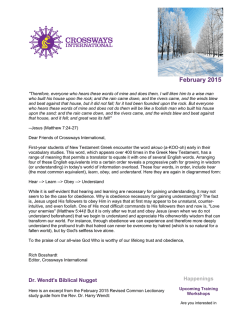
Fourth Sunday after Epiphany, B Melinda J. Wagner Deuteronomy
Fourth Sunday after Epiphany, B Deuteronomy 18:15-20 Church 1 Corinthians 8:1-13 Mark 1:21-28 Melinda J. Wagner First Immanuel Lutheran Portland, Oregon February 1, 2015 Effective leaders know how important first impressions can be. When Glenn Lopis was hired to become the senior executive of a business at the young age of 30, he knew he had a lot of work to do to earn the employees’ trust. He was an outsider to this particular company, and many employees were 20 years older than he was. So Glenn was intentional about his actions. On the first day of work, instead of walking directly to his office, he began to greet people at their desks. The first month on the job, he spent a good percentage of his time meeting with employees and asking their opinions about the state of the company, workplace morale, and other concerns. He encouraged them to ask questions and challenge his opinions, so employees would be free to bring forth their best ideas and contributions. He wasn’t posturing – this was Glenn’s authentic way of doing business. He intentionally put this style forward, right from the start, so people could see what kind of leader he intended to be. (www.forbes.com, 3/31/2014) Today’s Bible reading is Jesus’ first act of public ministry recorded in Mark’s gospel – and what a statement it makes! Jesus is teaching with authority in the synagogue, and immediately he arouses opposition. A demon-possessed man challenges Jesus, right there in the place of worship, and immediately Jesus casts the demon out to set the man free. What does this tell us about the kind of leader Jesus will be? We notice immediately how decisive, clear and direct Jesus is. He doesn’t hedge, he acts. It’s remarkable that the demon recognized Jesus and knew right off that Jesus had come to destroy him. He was right! Everything Jesus did on earth was calculated to defeat the powers of death and promote the way of life and wholeness and love. You could see it from the first moment. What else do we see? Confrontation. Conflict started here and there was plenty more to come, enough to lead Jesus all the way to the cross. The world would constantly resist the new creation Jesus brought, but Jesus never backed down. It was his mission to confront everything that can twist and diminish people’s lives. Natural forces, societal forces. Jesus cast out demons to set people free. He healed illness, he forgave sins. He confronted prejudice and restored the dignity of outcasts. This is what he was about. What else do we see in Jesus? We see boldness and courage. Confronted with a snarling demon, Jesus is in no way intimidated. Jesus is familiar with evil, and he is just not afraid. He knows it is never in question whether good or evil is ultimately stronger in our world. God has won the ultimate victory. Love is stronger than hate. Life is stronger than death. Jesus lives that reality, and he gives us that assurance for our own lives too. Finally, we see in Jesus intense compassion. In this story Jesus is not the least bit touchy-feeling. That’s not his style in Mark’s gospel at all. But Jesus’s actions are, in fact, fiercely loving. He looks upon a man who is severely disturbed – perhaps he is mentally ill – and Jesus doesn’t shun him or judge him like everyone else does. He doesn’t avert his eyes. Instead, Jesus responds compassionately to this human being, this valuable person. He recognizes this man as a child of God and uses God’s power to set him free. This is fierce love indeed. Jesus is loving fiercely, in the manner of someone who steps in to advocate for the welfare of a vulnerable friend or family member, working to get them what they need, to bring about the best outcome possible for this person who is infinitely precious. Jesus is loving fiercely, tenaciously, like the mother of a child with autism who negotiates persistently with the school system to assure that her son be treated with dignity and receive every bit of education he’s entitled to under the law. That mother loves her child and she won’t give up. Like God loves the children of earth, and won’t give up. Jesus is loving fiercely, like the husband who won’t leave his wife’s bedside and interrogates every health professional who enters the hospital room, to better understand her medical condition so he can help make decisions for her well-being. Jesus is loving fiercely, like the daughter who networks like crazy to get her elderly parents meals and housekeeping help and doctor appointments, to keep them living in their home as long as possible. God is loving the human family with a love that holds God’s children precious – every single one of them -- and gives everything to bring them to greater health and life and freedom. This is God’s work in Jesus Christ our Lord. I’ve preached on this particular scripture text many times before, but this year when I came across it again, I have to admit it hit me right between the eyes. My initial reaction was: “Wow, I would give almost anything to be able to do what Jesus did.” To set that man free, to set every person free from what imprisons them and distorts their lives. Because for me, as your pastor, as a person, this language of demons has ceased to be a curiosity or a dramatic fascination. Instead I see it as an all too accurate description of what a lot of people go through. Like you, I am very much aware of the demons that twist and diminish people’s lives. I see it in the lives of our members and friends. And First Immanuel’s urban location shows us the effect of demons in a particularly visible way. Almost every day we encounter people who are mentally ill and not receiving the kind of care they need. Almost every night we have people camping on our property, who might be mentally ill, or addicted, or on the run from bad situations. I don’t pretend to understand it all, and it often breaks my heart, how people’s lives can be distorted and go so wrong. I commend to you an excellent series called “Our Homeless Crisis” by Anna Griffin, which is running in the Oregonian right now. The third of seven installments is in today’s paper. (If you don’t subscribe to the paper you can find it online at www.oregonlive.com.) This series is helping me better understand who is on the streets, and why, and what can be done. Back in 2005, Portland and many other cities embarked on a 10-year plan to end homelessness. It went pretty well until the Recession. Now Portland is behind the rest of the country, and it’s possible to analyze why. Read the series, see what you think. I find it helps to get some facts to frame my personal experiences. It helps, too, to know that leaders are not sitting still. Good people are coming together again to re-set our public response to the crisis of homelessness. I am hoping and praying for the best, and I’m watching for a way to get involved. Jesus began his ministry in an awesome way. I am deeply moved by the way he decisively set that one man free in the synagogue. But I am also deeply grateful that Jesus Christ came to earth with more power than just that – grateful that in Jesus Christ, God has set ALL of us free from sin and death and the power of evil, and has given us a path to follow in Christ’s way. Because Jesus has confronted and defeated the powers of evil, we can find strength to confront the darkness and dedicate ourselves to the mission of healing, too. We are not Jesus. We don’t have the divine, miraculous power he had. But we do have power. We do have authority. We do have courage, and we do have hope. And we do have God’s presence with us at every moment to guide, encourage, strengthen, and direct us. I wonder what kind of fierce and compassionate love we might be empowered to extend, through our energy and abilities, and God’s help. In what ways can we assist the people closest to us, who struggle with needs that bow them down? God’s love inspires us to never give up. We belong to God and we belong to each other, and God gives us what we need. Everybody’s got something, as they say. Some struggle. Some issue. Every person has some burden, known to God, held close to God’s heart. And the God of fierce compassion is fiercely and persistently on the side of healing and wholeness, to bring us to a place of greater health and hope. Watch for God’s love. Watch for God’s help, each day. As our gaze broadens out wider, I wonder in what ways we may reach out beyond our closest circles, to advocate for healing and compassion in our community and world. How can we be allies with shelters like Rose Haven, or organizations like AA and NAMI, the National Alliance for Mental Illness… How can we add our love and commitment to God’s love and commitment, for the welfare of the human family? We will each respond as God’s people where we are. In our own lives, we will call upon God for strength and perspective and peace. We will rest secure in God’s love and forgiveness. As part of the human family, we will look for ways both small and large to share God’s compassion and strength. And we’ll live confident in God’s promise that always, we belong to God, and not to evil. God claims us forever, God loves us beyond our sin, and God stands with us against everything that diminishes life. God is acting decisively, today, to heal what is wounded, to set free what is captive, to lift up what is bowed down. God is restoring life, even through you and me. Thanks be to God. Amen.
© Copyright 2026
